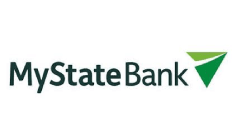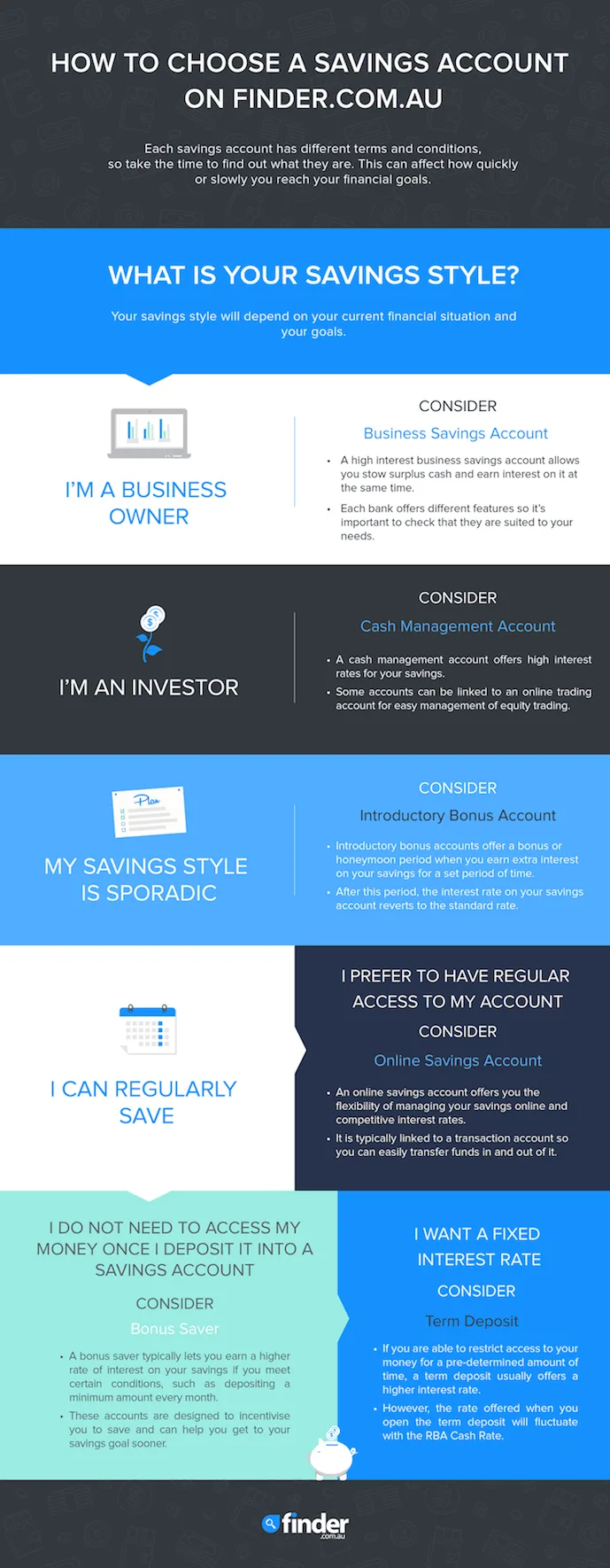
Compare Savings Accounts
Whether you're a regular saver, someone who puts money away here and there, or are just beginning your savings journey, there's a savings account for everyone. Compare savings accounts interest rates, features and fees side-by-side with our handy guide.
We’re reader-supported and may be paid when you visit links to partner sites. We don’t compare all products in the market, but we’re working on it!
Compare savings accounts for September 2021
We update our data regularly, but information can change between updates. Confirm details with the provider you're interested in before making a decision.
Compare up to 4 providers
Banks
- What's happening with savings accounts in September 2021?
- Use our savings calculator to see how much you could earn
- How do I open a savings account?
- Why do banks offer high interest and bonus rates?
- How to compare savings accounts if...
- Let’s get started building your wealth
- What's a savings account?
- How to compare savings accounts interest rates
- How do I withdraw money from the savings account?
- How to compare savings accounts
- How do compare ethical savings account?
- How do I get the bonus interest rate on my savings account?
- How do I find a savings account for my situation?
- What's the right account for my savings style?
- How to apply for a savings account online
What's happening with savings accounts in September 2021?
This month Virgin Money announced a new limited-time bonus rate offer on its Boost Saver Account. New customers who open a Virgin Money Boost Saver Account before 30 November 2021 can earn a special bonus rate up to 1.5% p.a. for the first 3 months, which will then revert to the existing ongoing bonus rate of up to 1.20% p.a. thereafter.
During the last month ING announced it was making changes to its popular Savings Maximiser Account. It'll be stopping its current offer of customers getting a rebate for all ATM fees, and capping this at the first 5 ATM fees per month only. Instead, it will offer 1% cash back on utility bills when they're paid from an ING Orange Everyday Account. If you want to know more, here's why ING is ditching unlimited free ATMs for a new cashback offer.
Digital bank Up revealed it will be acquired by Bendigo Bank. Customers with an existing Up Account won't be impacted, it's just the ownership of the bank that will change behind the scenes. If you're a customer, you can read more about Up Bank being sold to Bendigo and how it'll impact you.
We also heard news of Greater Bank merging with The Newcastle Permanent. If you've got a savings account with either bank, this will remain unchanged as both brands will be kept as they are throughout the merger.
Updated by Alison Banney on 3 September 2021.

Filter products to match your search
- Enter your initial deposit amount in the field above the table, as well as how much you expect to deposit each month.
- If you've got a time frame in mind (for example a short term savings goal) enter this in the 'Period' field
- Hit 'Calculate' to see how much interest you can earn with each savings account.
Use our savings calculator to see how much you could earn
Watch your money grow as you earn interest over time.
How do I open a savings account?
- Compare savings accounts until you find one that meets your needs.
- Submit your application. You’ll need to provide certain identification documents with proof of your residential address including your passport and/or drivers license so have those handy.
- Transfer the minimum initial deposit into your new account if applicable.
- Set up automatic transfer of the minimum monthly deposit required to achieve the high bonus interest rate if applicable.
- Start earning interest and putting your savings to work!

Why do banks offer high interest and bonus rates?
They are rewarding you with bonus interest for letting them borrow your money to loan to others while it sits in the bank. You may be limited in how often you can transfer funds from one savings account to another to take advantage of the highest interest rate available.
The introductory bonus rate offered by some providers is an incentive to open an account with them instead of another bank. This is for new customers only, which means you can’t apply for the same account again and again and expect to get the maximum rate.
I get it now! Let’s compare savings accounts
How to compare savings accounts if...
Use your savings style as a guide for getting to your savings goal. Each savings account has different terms and conditions, so take the time to find out what they are. This can affect how quickly or slowly you reach your financial goals.
Let’s get started building your wealth
Do you want to be able to afford a house, a new car, or your children’s education not just ‘someday’ but in the next few years? If you want to reach your savings goals, you should think about putting some money away in a savings account.
There are a lot of factors to consider when you compare savings accounts to find the right one for you. We made this page to help you find the best savings account for your situation – without you having to open a dozen tabs in your browser and scour the web for answers. Just simply compare options, apples with apples.
You’ll be empowered with the information you need to make a decision that will help provide a successful financial future for you and your family.
If you have a question or want to get in touch, we offer our “ask a question” service at the bottom of the page as well as a 24/7 live chat service.[treasure_hunt]
What’s in this guide?
What's a savings account?
A savings account is a secure bank account that earns you interest over time. These have higher interest rates than standard transaction accounts, enabling you to save for big spending items like a car or the deposit on a house, or save money for a rainy day. You usually need to deposit a set amount of money into the account each month to earn the high interest rate.
Benefits of savings accounts
- Savings accounts are a safe investment and are covered under the Government Guarantee.
- They’re a great tool to help you save and budget.
- Savings accounts are liquid. It's harder to withdraw your money from a term deposit, or share trading account (when it's invested in shares).
- You earn a higher interest rate than your everyday transaction account
- You can use them to save up for your house deposit.
Drawbacks of savings accounts
- You are usually required to deposit a set amount each month and make no or minimal withdrawals in order to receive the high bonus interest rate
- Savings accounts do not come with a debit card so you’re unable to access your cash as easily as transaction accounts
- Interest rates for savings accounts are becoming quite low, as the official cash rate falls
How to compare savings accounts interest rates
To encourage account holders to save and in exchange for using your money to give out loans, banks will award you an interest rate. The interest rate on your savings account is variable, meaning it changes according to the Reserve Bank of Australia (RBA) cash rate. If the interest rates on all savings accounts are low, it usually means the RBA cash rate is low.
In some cases, the interest on your account is calculated daily and paid monthly. This means you’ll get compound interest so you earn interest on your interest. You have to read the fine print to see if your account pays interest monthly to be sure you will get compound interest. Interest that is paid annually isn’t compounded as often and thus won’t be as lucrative for you.
When comparing interest rates, it's important to pay attention to the requirements set in order to achieve the high bonus interest rate - this usually requires you to deposit a certain amount of money in the account each month and limits the number of withdrawals you can make. Don't just opt for the account with the highest interest rate, because you might not be able to meet the deposit conditions to get that rate.
Some savings accounts also offer a high introductory variable interest rate which is higher than the standard variable rate for a set period, usually a few months. This is a reward for selecting their savings account. However, it’s important to be aware of how long the introductory bonus rate will apply and what the rate will convert to after this period.
From the Australian Tax Office’s perspective, the interest you earn on your savings account is considered to be income. That means it will be taxed at the highest marginal rate unless you’re able to provide a Tax File Number. Then you’ll be taxed at the rate you’re supposed to be taxed.
How do I withdraw money from the savings account?
Savings accounts usually don’t come with a debit card like everyday transaction accounts.
To access the funds in the savings account, transfer your money from your savings to your linked everyday account. Depending on the savings account you choose, there may be stipulations as to how often you can withdraw from the account. Savings accounts offering higher interest rates may not allow you to touch your money for extended periods of time, or may penalize you for doing so.
If you know you want to lock away your funds for a longer period, you may want to consider a term deposit instead of a savings account.
How to compare savings accounts
There are certain features to keep in mind when comparing savings accounts, including fees, interest rates and your personal savings goals. Read below to find out how these factors can help you compare savings accounts and choose the right one for your needs.
Low or no fees
Most banks don’t charge a monthly fee for maintaining a savings account. Look for an account with no (or very low) monthly, annual, and transaction fees. The idea is to build wealth (not pay the bank to store your money!).
High or competitive interest rates
Getting the highest interest rate means your money can work harder for you. You’ll want to check the conditions involved in receiving the bonus or introductory rate. The bonus rate might only last the first few months so be sure to check the standard rate too.
Savings goals (short-term v long-term)
You will want a different type of savings account depending on your savings goals. If you are saving to buy something in the short term (a few months or a year), high bonus rates and a lower standard rate may be great. However, if you are saving to buy something over the long term (a few years), you might benefit more from an account with moderate but stable rates. Use our calculator to do the math and see which account will get you to your goal.
Easy access
Some savings accounts allow you to withdraw money a few times each month, while some require you make no withdrawals at all. If you anticipate needing regular access to your savings, you won’t want an account that will charge you for doing so. However, being charged for accessing your account is also a great incentive for not touching your money and letting it grow. Compared to term deposits, savings accounts offer relatively easy access to your money.
Linked accounts
Some banks require you to link your savings account with an everyday account in the same bank to qualify for their interest rate or bonus rate.
Deposit requirements
If you can consistently deposit money into your account (for example your regular salary), you should look for accounts offering bonus rates for meeting monthly minimum deposits, like a Bonus Saver account. Otherwise, an Introductory Bonus savings account might be best.
How do compare ethical savings account?
If you want to make sure your savings account is ethical and aligns with your values, consider the following when choosing an account.
- Check your current bank's values. If you already have a savings account, check their website to examine what their investment values are now. If this information is not disclosed you can call or visit a branch to find out more information.
- Look at how your money is being invested. Once you understand what your bank's investment policies are, you can find out where your savings are being invested in now. In most cases, banks that provide ethical savings accounts will disclose this information openly.
- Your personal beliefs and values. Think about the causes that you are passionate about, and how you can make a positive difference to society or to the environment. Then narrow down your choices based on those.
- Make the switch if necessary. If you are not comfortable with the investing principles of your current bank, or find one that is more suited to your morals, it is typically easy to switch your accounts by providing your new bank with the details of your current accounts.
How do I get the bonus interest rate on my savings account?
There’s a difference between a headline rate and base rate. For an Introductory Bonus account, the bonus interest rate is only awarded for the first couple of months (normally up to four) and you need to be a new customer.
For a Bonus Saver account, the bonus interest is usually awarded when you’re able to deposit a certain amount per month and make no withdrawals. It usually doesn’t matter if you’re a new customer or not, but there may be restrictions on the amount of accounts you can have.
You will also need to be within the balance your bonus rate applies to. In most cases, any balance beyond $250,000 usually earns the standard variable rate.
How do I find a savings account for my situation?
| Are you | Description | Features |
|---|---|---|
| Youth and student | Whether you're studying, doing an apprenticeship or under 18, there are still a range of accounts available for you. Every dollar counts at this stage, so check if you're eligible for a low-cost student account. | |
| Saving for a goal | Setting a goal and developing a savings plan is easier than you think. There are a few ideas that can help, including taking advantage of a sweep facility or locking it away in a term deposit. Also, take note of the interest rate and understand the features you can use. |
|
| Retired and seniors | Whether you love the convenience of Internet and phone banking, or prefer face-to-face banking in a branch – financial institutions offer a range of options. |
|
| Accounts for children | Most parents want to help their kids manage their money responsibly and learning to save is an important skill for the future. Help your child's savings grow by choosing the right account. |
|
| Moving to Australia | Whether you've moved to Australia for work or study, Australian banks have a wide range of options for you. You'll need an everyday bank account for your everyday banking and most likely a savings account to store any surplus cash. |
|
| Looking for an online account with no fees | Fee-free banking means every dollar you deposit gets you closer to your savings goal. Plus, online accounts typically offer higher interest rates. |
|
What's the right account for my savings style?

How to apply for a savings account online
So you have gone through, compared savings accounts available on the market, and are ready to apply. The process involves filling in an online application, verifying 100 points of identification if you’re a new customer and depositing funds into the account to get your savings plan started. Items such as a passport or birth certificate are worth 70 points, while secondary documents such as driver’s licences are worth 40 points. If you already have an account with the same bank you will not have to satisfy the 100-point check.
Not an Australian resident? Don’t worry, you can still apply for a savings account if you’re an expat or intend to move to Australia permanently.
You’ll need the following documents to apply online:
- Your personal details. This includes your full name, address, phone number and email address.
- Your Tax File Number. This ensures that you get taxed the correct rate when earning interest and not at the highest marginal rate.
- Identification. A driver's licence, passport or birth certificate will do.
Alison Banney is the banking and investments editor at Finder. She has written about finance for over 8 years, with her work featured on sites including Yahoo Finance, Money Magazine and Dynamic Business. She has previously worked at Westpac, and has written for several other major banks including BCU, Greater Bank and Gateway Credit Union. Alison has a Bachelor of Communications from Newcastle University, with a double major in Journalism and Public Relations. She has ASIC RG146 compliance certificates for Financial Advice, Securities and Managed Investments and Superannuation. Outside of Finder, you’ll likely find her somewhere near the ocean.
Read more on this topic
- Disposable income in Australia
Finder analysed earnings and living expenses to find out where Aussies have the most disposable income and where is the best place to retire.
- Australian household spending statistics
Finder crunched the numbers on Australia's household spending statistics and found ACT households are the nation's biggest spenders.
- Student finance statistics 2021
Finder's student finance statistics show that 87% of full-time students are stressed about their finances, and 1 in 3 struggles with rent.
- Marriage and divorce statistics 2021
Finder found more than 3 million Aussies have lived with an ex-partner to save money.
- The expenses preventing Aussie households from saving
Food, utility bills and eating out are the top expenses preventing Australians from building wealth. Find out how to boost your income and cut your expenses.
- Virgin Money Grow Saver account
Earn 0.65% p.a. on your savings each month you make at least one deposit and make no more than one withdrawal.
- Virgin Money Boost Saver (for 18-24 year olds)
The Virgin Money Boost savings account (for 18-24 year olds) offers bonus interest each month you deposit money and meet the purchase requirements. Here's how the account works and how to apply.
- Virgin Money Boost Saver Account (25+ year olds)
The Virgin Money Boost savings account (for 25+ year olds) offers bonus interest each month you deposit money and meet the purchase requirements. Here's how the account works and how to apply.
- Savings account statistics 2021
Did you know that the average Australian has $29,091 in savings? Learn about this and more in our savings stats report.
- Joint savings accounts
You can open a joint savings account with another person to save for a shared goal. Here's how they work and how to find the best joint savings account for you.







I want to find the best saving account but not be restricted in having to also have an everyday transaction account with that bank.
Hello Karen,
Thank you for your comment.
If you are referring to easy access to your savings account, you can check everyday transaction accounts and compare the interest rates, features, and fees of the account. Please click the “Go to Site” button to submit an application.
Please make sure that you’ve read the relevant T&Cs or PDS of this account to help consider whether the product is right for you.
Should you wish to have real-time answers to your questions, try our chatbox on the lower right corner of our page.
Regards,
Jhezelyn
Enquiry is regarding interest bearing savings accounts, which banks offer these to over 55’s?
Hi Jan,
Thank you for your inquiry.
You may compare your options from our list of retirement savings accounts. There is a calculator at the top of our comparison table where you can put in your deposit and select your term to get an estimate of your interest earnings.
It is noteworthy to state the eligibility and product terms vary across different savings accounts, so you need to review them fully before applying.
Hope this helps.
Cheers,
Jonathan
How do I find -if a lost bank a/c many years ago?
Hi Marjorie,
Thanks for your comment.
Our finding lost super guide should help you know how to find unclaimed money. This page outlines a few options available to you in Australia.
Hope that helps.
Clarizza
Can I get a Day to Day interest account at Suncorp bank
Hi Margaret,
Thanks for your enquiry.
If you are interested in applying for a high-interest savings account with Suncorp bank, you can compare their transaction, savings and term deposit accounts on a range of Suncorp Bank savings accounts to compare.
With a Suncorp savings account, interest is calculated daily and paid into your account each month, quarter or six months depending on which account you hold. If you would like to find out more about how and when interest is calculated for a particular account, you can view their ‘Product Features at a Glance’ section of the Personal Deposit Account Product Information document on their website.
Please ensure to read through the relevant product disclosure statement and terms and conditions to ensure that you got everything covered before you apply.
Thanks,
Belinda